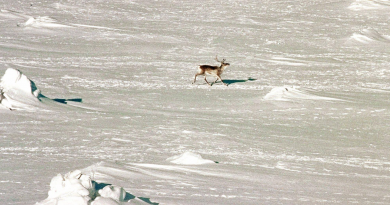Economic activity in northern Canadian territories of Nunavut & Yukon increased despite pandemic, new index suggests

A new experimental index developed by Statistics Canada suggests that the pandemic may not have had as large an effect on economic activity in the North as it has elsewhere in the country.
A report published Friday shows that economic activity, measured across a variety of indicators, actually increased in Yukon and Nunavut since September of last year.
According to the index, Yukon saw between 2.4 and 3.9 per cent more economic activity this September than in September 2019, while Nunavut saw growth of 5.6 per cent — the most in the country.
Manitoba was the only other province to see a year-on-year increase, at a time when most provinces are showing stagnant numbers or steep declines.
In the N.W.T., for example, economic activity appeared to drop by nearly 12 per cent — the worst showing in the country outside Saskatchewan and Alberta.
“The signal that seems to be coming out is that the North was not as impacted as the South during that first kind of wave of COVID-19,” said Ryan MacDonald, the principal researcher with Statistics Canada behind the new index.
Monthly numbers also show modest economic recovery underway in all three territories since June.
More detailed look at impact of pandemic
The new index was developed by researchers with Statistics Canada to provide a picture of the country’s economic activity in between annual estimates.
Statistics on national-level economic activity are frequently updated, and Statistics Canada produces monthly information on specific indicators, like retail sales or hours worked, for many provinces and territories.
But a regular assessment of overall economic performance in each province and territory was previously hard to find.
Normally, Statistics Canada experiments extensively with indicators before an index is released — but the pandemic means they are trying out new things fast.
“The project was designed to provide some more timely information about the way the provincial and territorial economies have been unfolding as we go through COVID[-19],” MacDonald explained.
But the speedy development means comparisons between provinces and territories may be less reliable, he cautioned.
“There is some conflicting signals coming out of this,” he said.
The new index uses two different methods to collect and analyze data on sector-by-sector activity collected by provinces and territories — data as varied as new building permits, electricity usage, the consumer price index, and hours worked.
One, called principal component analysis or PCA, extrapolates common trends among that data to make a general assessment of the economy. The other, called least absolute shrinkage and selection operator or LASSO, tries to identify the most important trends for each economy.
The PCA index paints a more volatile picture of economic activity over time, MacDonald explained, so Statistics Canada provides both numbers for most provinces — but data in the N.W.T. and Nunavut are spotty enough that only one method could be used.
Related stories from around the North:
Canada: Agnico Eagle bids $286M for TMAC Resources, more than Chinese offer for Nunavut gold mine, Thomson Reuters
Finland: Lapland tourism to lose over 60% of winter business says Finnish survey, Yle News
Russia: Shipping on Northern Sea Route breaks record, The Independent Barents Observer
Sweden: The Arctic Railway – Building a future or destroying a culture?, Eye on the Arctic
United States: RBC latest bank that will not directly fund drilling projects in Alaskan Arctic refuge, CBC News



